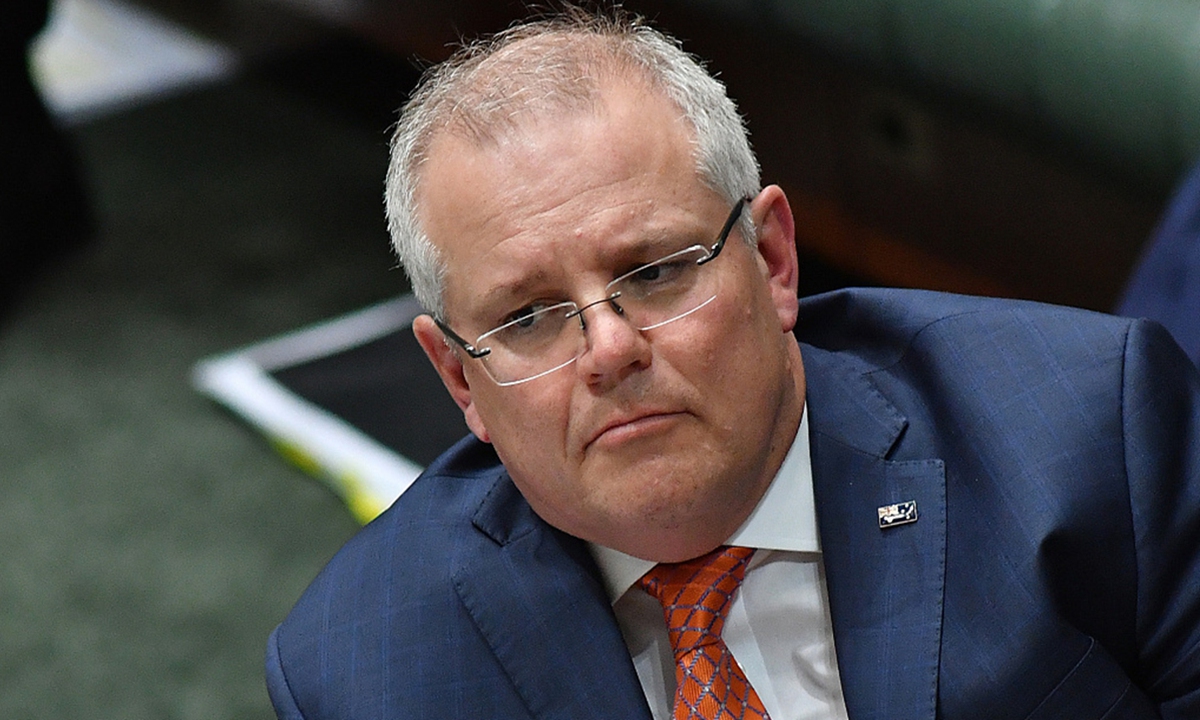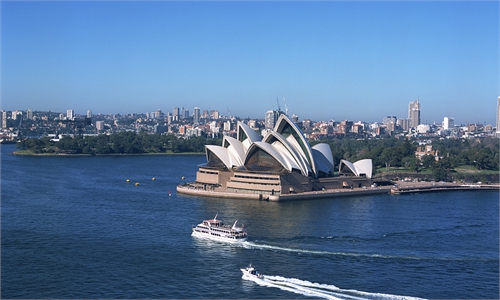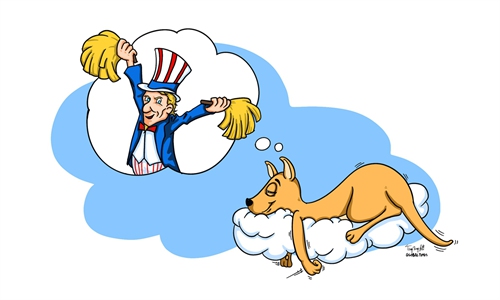Will specter of Trumpism haunt Morrison?

Australian Prime Minister Scott Morrison. Photo: VCG
Australian Prime Minister Scott Morrison in recent days has drawn criticism for stopping short of criticizing outgoing President Donald Trump's role in inciting the Capitol riots on January 6. In a Monday tweet, former Australian prime minister Kevin Rudd accused Morrison of being a "coward." "World leaders like Johnson, Trudeau and Merkel condemned Trump. Morrison hasn't, despite the preservation of US democracy being central to our alliance," Rudd said.Morrison has indeed made a distinction of himself by not criticizing Trump like other Western leaders. There is a recognizable immaturity in Morrison's handling of Australia's foreign policies, and moreover, he has been a longstanding sympathizer of a series of Trump's policies, especially his China policy.
Rudd lashed out at Morrison, emotionally calling him a "coward." By avoiding denouncing Trump, Morrison has demonstrated a recklessness to defy leaders from nearly every major Western country who unanimously criticized Trump's role.
Morrison has actually flouted basic understandings of Western democracy. He often boasts about Australia's so-called democratic values. But in view of the Capitol riots that almost subverted Western democracy and dealt a heavy blow to the Western system and governance models, Morrison only simply said it was "very disappointing." His disapproval was superficial and symbolic, failing the Australian public's expectations. In no way does he true-heartedly defended Western values.
Morrison is under tremendous pressure at home. He is being accused of getting too close to Trump by the Labor opposition. Morrison on Tuesday praised a host of Trump officials (such as Vice President Mike Pence and Secretary of State Mike Pompeo, Treasury Secretary Steven Mnuchin, and former Defense Secretary Mark Esper) for supporting Australia over the past four years, without mentioning Trump. This was interpreted as a move to distance himself from Trump at the last moment before the Biden administration comes to office.
Morrison is an opportunist. Two kinds of thinking dominate his diplomacy: One is opportunism, and the other is adventurism. Morrison in fact is indisposed to rejecting Trump and his hawkish ideology. The Morrison government has offered great support to a series of Trump's policies, especially his Indo-Pacific Strategy and China policy. Amid the intensifying US crusade on China, Australia under Morrison's leadership has attempted to take a free ride of the US anti-China chariot to increase its profile as Washington's deputy sheriff in the region. It has stood at the anti-China forefront, acting as a pioneer of the US anti-China campaign.
The unpleasant telephone conversation in January 2017 between former Australian prime minister Malcolm Turnbull and Trump a week after the US president assumed office made many people believe cracks appeared between the US and Australia. But since Morrison took office, Australia has acted in step with the US and Morrison has won Trump's high recognition. Trump praised Morrison as "a man of titanium" in September 2019, and awarded him the Legion of Merit, a military decoration honoring "leadership in addressing global challenges" in December 2020.
But now Morrison is in a very awkward position. It's too early to judge whether the Biden administration will bring a major turnaround in China-US relations after it is sworn in. But at least the Biden administration will very likely not take a reckless and irrational approach toward China as its predecessor has done. There is a great possibility that China-US relations will return to normal, while at the same time, China-Australia relations see no sign of significant improvement in the near future.
Because of Morrison's opportunism and adventurism, he completely bets on the US, plunging China-Australia relations to unprecedented low ebb. It's always easier to break than to make. How can we make a broken bowl what it was before things were shattered? Morrison and his administration should take full responsibility for the current deadlock of China-Australia relations.
The US-Australia alliance will continue to be important. After Trump leaves the White House, the specter of Trumpism will still haunt the minds of Morrison and his likes. The question is: How should Australia manage the alliance to avoid it affecting Australia's relations with a third country, in particular China?
Even if the Biden administration might continue to use Australia to suppress China, the Morrison government must consider what's best for Australia's own national interests. Australia is immature and lacks strategic vision to act as a US lackey. Playing such a role, Australia has gained nothing, but spoiled its comprehensive strategic partnership with China, its biggest trading partner. This is a regrettable result of Morrison's failing diplomacy.
The author is a professor and director of the Australian Studies Centre, East China Normal University. opinion@globaltimes.com.cn



